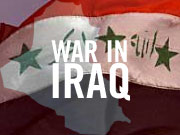Audio
Photos
Resources
Your Voice
| |||||||||||||||||||||||||||||
Carter calls for peaceful solutions to world conflict
February 21, 2004
Former President Jimmy Carter says the U.S.-led invasion of Iraq was completely unwarranted. Carter spoke Saturday at the 16th annual "Nobel Peace Prize Forum" at St. Olaf College in Northfield. Carter was president from 1977-1981, and won the Nobel Peace Prize in 2002 for his efforts to find peaceful solutions to international conflicts. Carter also said the U.S. should worker harder to peaceably resolve conflicts with other nations.
Northfield, Minn. — Former President Carter used his address, "Peace and Change," to talk about what he thinks the United States needs to do to bring peace to more places around the world. Carter said conflict, although commonplace, is really not complicated.
 | |||
"I finally realized that the causes of conflict -- between a husband or a wife, or a father or a son, or among students on a campus like St. Olaf, or a conflict between two nations or a civil war -- are the same causes. It's an inability to understand one another," Carter said. "A denigration or condemnation of another group or person as inferior, not worthy to equally share emotion and hopes and dreams for the future, and also quite often a reluctance to bring in even a trusted mediator."
Carter blamed the Bush administration for squandering international goodwill toward the U.S. following the Sept. 11, 2001 terrorist attacks.
"The completely unwarranted, almost unilateral war that we started in Iraq is a typical example of this, and it's not the only one," Carter said. "We brand people as the axis of evil and it alienates them. Sometimes their leaders obviously deserve condemnation. But it arouses within their people -- quite often people who are suffering under a despotic leader -- a sense of fear and intimidation and aggravation, and even hatred of the United States."
Carter said peace around the world is dependent on peoples' rights to basic freedoms, and he said the growing gap between wealthy and impoverished people poses an increasing threat to peace.
|
There's no sense in our country of shame, or a desire to ... be more benevolent, more caring, more knowledgeable about other people. They're just in a different world from ours and we really don't care much about what happens to them.
- Former President Jimmy Carter |
To that end, Carter said the U.S. needs to share more of its wealth with other nations. And he suggested it's wrong that so many Americans don't seem to care that many people around the world live in poor conditions.
"We fail miserably, not just our government -- the Republican incumbents -- but our country fails. If you take all of our gross national product and add it together, we give about one-tenth of 1 percent -- one-one thousandth -- to others. The average European country gives four times as much per capita," said Carter. "But there's no sense in our country of shame, or a desire to improve. Or to be more benevolent, more caring, more knowledgeable about other people. They're just in a different world from ours and we really don't care much about what happens to them."
The former president also talked about his work at the Carter Center, monitoring areas of conflict around the world. Carter took no reporter questions, but did field a few from the audience.
He said he expects conditions in Haiti to worsen before they improve. On the Palestinian-Israeli conflict, Carter said he thinks the best path to peace lies in the Geneva Accords.
As for domestic politics, Carter said the best way to get away from the nation's current political polarization would be to reject attack-style campaigning.
Carter took one final question from the audience.
"Mr. Carter, would you be willing to run for president this year?"
"No thanks," Carter replied. "I'd rather be here with you. Thanks a lot."
Carter was introduced by Walter Mondale of Minnesota, who served as vice president under Carter.
|
News Headlines
|
Related Subjects
|


